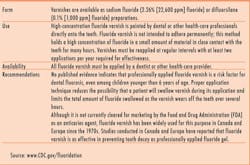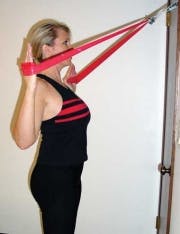Online CE conference brings the show virtually to you
Editor’s Note: Karen Davis, RDH, BSDH, is the founder of Cutting Edge Concepts, a Richardson Texas,Karen Davis, RDH, BSDH
RDH: Do you remember what initially inspired the development of this course?
Davis: My personal interest in this topic originated out of necessity from two perspectives. From a personal standpoint, two years ago my husband was diagnosed with a rare form of pancreatic cancer and my daughter was diagnosed with Crohn’s disease. I began to look more closely at the impact diet has on overall health. One recurrent theme I kept reading about was related to the potentially detrimental effects of sugar consumption. I began to look for alternatives to refined sugar from a personal perspective for healthier alternatives for my family.
From a professional standpoint, I am seeing increasing evidence of demineralization and decay related to daily consumption habits of soft drinks, power drinks, and carbohydrate snacking, and out of necessity began to look for products to help my patients prevent and reverse the decay process.
RDH: How active do you think dental hygienists should be in educating patients on evaluating the nutritional information in the foods and beverages they consume?
Davis: I think dental hygienists are in a perfect position to help motivate patients to be better informed about nutritional information and to make better choices with food and beverages.
I find that most patients are not fully aware of the impact an acidic environment has on the teeth when sugar consumption is repeated numerous times throughout the day. In fact, just yesterday, I had a patient share with me that he has begun to read food labels about sodium intake based upon his physician’s recommendation to control high blood pressure. Unfortunately, he had several areas of new decay related to his recent increase in soda consumption.
I took advantage of the opportunity to educate him on the value of reading food labels for hidden sugar information also. But, just like many patients, he had not given this any prior consideration. To treat decay or help remineralize tooth structure, without providing nutritional information about food and beverage choices, only solves one aspect of the problem for many of our patients.
RDH: Can you give us an example or two of how the progress in remineralization products has impressed you?
Davis: I like the fact that we have choices! There is not one product alone that works in every situation. The emergence of products that are positively impacting the oral environment can be tailored to meet the needs of our patients.
For example, if we have patients with white spots, remineralization products that have Recaldent would be a good choice. If we have patients that have caries coupled with sensitivity, products that have 5000 ppm sodium fluoride and/or Novamin are good choices. If we have patients that have increased risk for caries due to dry mouth, products with xylitol are good choices.
I appreciate the companies that are investing in research and development of products to prevent decay and remineralize tooth structure. Seeing remineralization take place in a patient’s mouths is very rewarding!
RDH: Can you give us an example of a tip you will share with dental hygienists that will help patients control their sweet tooth?
Davis: A tip I have personally used in my family is to prepare food with fresh herbs and seasonings as much as possible which increases satisfaction while eating, and consequently doesn’t leave one craving something else later. In addition, I keep dry walnuts and almonds to snack on whenever you do feel a craving for something sweet.
The combination of increasing the taste of food naturally, and replacing the sweet craving with a substitute, actually helps reprogram the brain as to what it desires. Once desires or cravings have changed, it is easier to maintain new habits of reduced sugar consumption.
RDH: What do you find exciting about presenting this course at the virtual RDH Event conference?
Davis: In my opinion, the virtual RDH Event tends to attract clinicians really interested in cutting-edge information to implement into their patient care. It is exciting to be able to share information to help professionals inspire patients to make healthier food and drink choices, which will positively impact the oral environment as well as overall health!
Facts about RDH Event
When: Sept. 16-17
Where: Your home, office, wherever it is convenient for you.
How: Register at RDHEvent.com
Cost: Registration and all activities at the virtual conference are free. In some cases, courses are archived at IneedCE.com after RDH Event concludes, and a fee may apply to course participants who view a seminar later. The Web site encourages attendees to enroll and secure CEUs promptly.
Seminars at RDH Event, Sept. 16-17
America’s Sweet Tooth Obsession and its Impact on Oral and Systemic Health
presented by Karen Davis, RDH, BSDH
This program reviews the literature related to sugar’s impact on overall health, and provides good news for today’s clinician seeking methods to help reduce decay, remineralize tooth structure, and motivate patients to reclaim their health.
This course shares information to help “diagnose” the hygiene department in a dental practice, providing an action plan to increase hygiene proficiency, increase operative/hygiene case acceptance, patient access to care, patient advocacy, patient retention, practice leadership and the profitability of the overall dental practice.
This course details strategies for communicating effectively with patients by embracing key concepts of the motivational interviewing (MI) philosophy. How do you motivate your patients to prevent disease or improve their oral health? MI has been shown to be effective in counseling and is now being utilized successfully in health care and dentistry.
This course provides essential tools for evaluating current dental hygiene positions and career success. The presenter helps the audience to determine the next steps to obtaining the skills needed to get to the next level of career success (raise, additional job responsibilities, a new position, etc.), develop clinical and business competencies for stronger self-marketing focus, and focus on utilizing a mentor for personal and professional growth.











